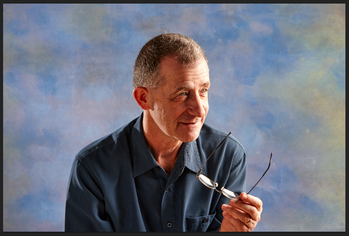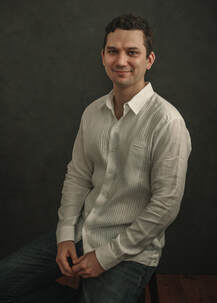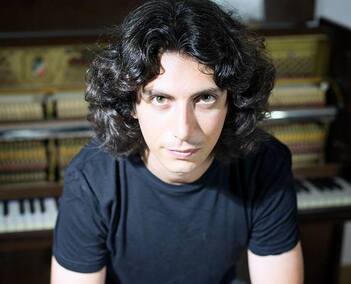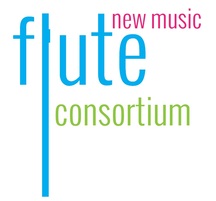Get to Know...Sen Lin We consider ourselves very lucky to be exposed to so many wonderful composers through the FNMC Composition Contest. It offers us the opportunity to become familiar with the music of composers from throughout the United States and all over the world! We’ve had finalists and winners from Argentina, Australia, China, Croatia, Greece, Hong Kong,Italy, Korea, Mexico, Portugal, Spain, Switzerland, and Taiwan. From 2014-2018 we’ve recognized 58 different composers through the composition competition, many of whom we would not have had the opportunity to learn about otherwise. A perfect example of this is Sen Lin. Sen was born and raised in China and is currently working towards his master’s degree and living in Weimar, Germany. He doesn’t have a web presence at this time, so without his entry in the competition our members wouldn’t have had the opportunity to learn about his Fantaisiestueck for flute and alto flute (finalist flute duo 2018). Fantaisiesteuck is a challenging romp with lots of opportunities to explore a variety of extended techniques and colors. Q&A with Sen… Who is/are your favorite “new music” composer/s and why? This position is constantly changing, but at the moment it belongs to Chaya Czernowin. Her music possesses an almost primordial gaze, originating from an immense and bottomless core, at this point to reveal some physical things. The process of revelation is a central concept to Czernowin’s oeuvre. This is what makes me very interesting. When did you join FNMC and what attracted you to the organization? At first I heard the FNMC was influenced by composer Zhou Long and his flute works. From there I also knew about the FNMC Composition Competition. I think this competition is very meaningful and helpful for composers, flutists and the development of new flute works. Last year I saw information about the FNMC Composition Competition on the Internet, so I did not hesitate to participate. More About Sen… Sen Lin was born in 1991 and started his musical education already in his childhood studying piano, music theory as well as composition in Suihua(China, Heilongjiang Province) where he grew up. After finishing high school, he studied composition under Prof. Jixue Wu at Shenyang Conservatory of Music in Shenyan during 2010-2015. Since 2016 he began his Composition Master studies with Prof. Michael Obst and Dr. Ulrich Kreppein at University of Music Franz Liszt Weimar, Germany. In 2016 he was the 1st Prize Winner at the international “Musica per Archi” Composers Competition. After one year he recieved a third prize at the 2nd Edition Alfred Schnittke International Composition Competition 2017, Ukraine. The awarded work Blue Flame is published by Italian Aldebaran Editions in 2018. His works include orchestra, chamber music as well as film music. His music has been performed by many professional ensembles and organizations such as DNT(Deutsche Nationaltheater und Staatskapelle Weimar), Ensemble Recherche and Lviv National Philharmonic Symphony Orchestra in Germany, Italy, Ukraine, China and the USA.
1 Comment
Get to Know...Margareta Ferek Petric Each time I write a composer spotlight for a work in the flute and accompaniment category I’m reminded how strong the entries are each year. Over the last two days, I’ve listened to each of last year’s works and all three (Jean Ahn’s Toys, Margareta Ferek Petric’s Beastie Poetry, and Joseph Hallman’s four pieces) are really intriguing works that I would enjoy playing and I feel this way pretty much every year! Like many of our members, I’ve played many of the winning, honorable mention, and finalist works and have a list of others I want to play in the future! Flutists are spoiled by the wealth of wonderful music being composed! Today, we have the opportunity to learn more about Margareta Ferek Petric composer of Beastie Poetry for flute/piccolo and piano. Beastie Poetry was selected as a finalist in the flute and accompaniment category in 2018. If you listen to Beastie Poetry and read her response to the question “what about new music for flute appeals to you?” I think you’ll come to the same conclusion I did, that Margareta is incredibly successful in exploring the many timbres of the flute without seeming cliché. Margareta organically incorporates extended techniques in a way that is much appreciated. Margareta recently shared with us some very exciting news, she was recently chosen as the new artistic director of Music Biennale Zagreb, founded in 1961, the festival is dedicated purely to contemporary experimental music. She will be the first woman to serve as artistic director. Congratulations, Margareta on this significant accomplishment! Q&A with Margareta… What about new music for the flute appeals to you? Flute offers a bright spectrum of possibilities which I find crucial for composing - it allows one to be subtle and rough, to explore the clichés of classical beauty, but to always be able to muddy and reframe the sound into experimental abstraction. The wide range of the flute family opens a playground for various ideas and the capability of using so many extended techniques uphold these ideas in a very special way. Who is/are your favorite “new music” composer/s and why? It is impossible to point out names of personalities and pieces without needing several pages to write them all down. Besides the renowned composers from the contemporary music scene, I discover my favorite ones along the way while visiting concerts and festivals, very often those are now living composer colleagues with refreshing new ideas and strong messages that they express through their music. Describe your musical background and current activities. Growing up in Croatia got me the natural privilege to be in a strong connection with the expression of the music of the Eastern Europe and the tradition of the western classical music was very well taught both in music schools back there and also later at the University in Vienna. I suppose these two strong influences always flow through my blood while composing and almost force me to find a middle way between them, but also enable me to switch in-between these worlds. Right now, I am very excited to work on a piece for accordion and ensemble and a chamber opera, which will be a big challenge since I have never written one. Between big commissions I always try to find time to write pieces which are dedicated to musicians whose work I love and respect and who are always supporting me to write new compositions for them. I find this very personal kind of collaboration very fruitful for both sides, especially for promoting contemporary music and us - now living and working composers. Where/How do you seek for the inspiration for your works? I cannot imagine my life without being curious about other art forms, science, politics, society, etc. There is always a story in my mind I want to tell, but I have to narrate it with sound. I suppose one can feel privileged in a position as a composer to persistently be able to reveal the current mindset through creative work. So, the impulses that give inspiration can mostly be found in an everyday life - book that you just read, painting that cannot leave your head after visiting the latest exhibition, interesting line from a movie last night, absurd political situation, inspiring talk with a stranger while walking home or simply the need to discover something new in some context outside of musical expression and take on the challenge to express it though notes. More About Margareta… Margareta Ferek Petric was born 1982 in Zagreb, Croatia. She studied composition with Ivan Eröd, Chaya Czernowin and Klaus Peter Sattler at The University of Music and performing Arts in Vienna. She was granted scholarships from various institutions and foundations (Home Suisse Foundation, Thyll-Dürr Foundation, Austrian Ministry of Culture, Office of the Austrian federal Chancellor - State Scholarship for Composers, etc.). In 2010, she was invited for a working stay in Casa Zia Lina on Elba by Thyll-Dürr Foundation and in 2011 she received a Theodor Körner Award for an orchestral composition Take 7. Since 2015 she is working as a part of the managing committee of the Austrian Society for Contemporary Music (ÖGZM). In 2016 Croatia was represented by Margareta´s music on 63rd International Rostrum Of Composers. 2017 she became a prize winner of Advancement Award from the city of Vienna. In 2018 Ferek-Petric was declared Artist in Residence of the Carinthian Summer Music Festival, she was awarded with Croatian prizes: Josip Stolcer Slavenski Award and Boris Papandopulo Award (both for All the world´s a stage - as the composition of the year in Croatia) and Prix Annelie de Man 2nd Prize and an Audience Prize in Amsterdam (both for the harpsichord piece Istaratu). Few of the latest works have been recorded on albums published by Decca Records and Croatia Records. Her music is being regularly commissioned and performed by renowned ensembles and instrumentalists, diverse festivals and is being played in radio stations around the world. Margareta´s work is “colorful, ironic and deep – with a strive to create absurd sound images”. She lives and works in Vienna, Austria. Learn more on her website: www.margaretaferekpetric.com If you Liked Beastie Poetry… DUO: Beastie Poetry - for Flute/Piccolo & Piano (2018) Searching for Spaces - for Bass flute & Pno (2016) Mad darkness I - for Traverso flute & Harpsichord (2015) QUARTET Climate Burn-Out (stress trilogy: part II) - for flute/alto flute, clarinet, cello & piano (2018) Fire Walk With(out)me - for Paetzold recorder, flute, harp & harpsichord (2017) (and a second video) QUINTET Spukgedichte - for Soprano, Fl/Bass fl., Cl, Vln, Vcl, Text by Richard Schuberth (2016) Noncerto - for Renaissance/Barock Recorder (optional with flute) & String Quartet (2013) ENSEMBLE Neun Echos - for Sopr., traverso flute, baroque oboe, baroque bassoon, baroque vln, Violone/G & Organ (2018) All the world ́ s a stage for Fl, Ob, Cl, BCl, Ten.Sax., Bsn, Hn, Trpt, Tromb, Tuba, 2 Timp, Perc, Pno, Harp, Strings (1,1,1,1,1) (2017) dieMacht for Fl, Ob, Cl, BCl, Bsn, Hn, Trpt, Tromb, 2 Timp, Perc, Pno, Strings (1,1,1,1,1) (2015) Wiener Schnitzel Uncensored - for Fl/alto fl., Cl, Vln, Vla, Vcl, Pno (2014) Get to Know...Martin Rokeach In addition to the opportunity to reacquaint myself with the piece they were honored for (in this case Going Up? for flute, viola, and cello), my favorite aspect of writing these features is learning a bit more about the composers. I often find a surprising or fascinating fact, an interesting parallel to other composers, a new piece I love, or a connection to someone I know or an FNMC member. While preparing Martin Rokeach’s composer spotlight, I found all of these! Perhaps of greatest interest to our members, many of whom love the piccolo as much as I do, Martin composed a wonderful piccolo concerto, available both in the original version for piccolo and orchestra and a very effective 2018 transcription for piccolo and piano. FNMC commissioning member Amy Likar has been a huge supporter of this concerto, she presented the world premiere performance with the Oakland Symphony Orchestra and has subsequently performed the orchestral version several times most recently with the University of Southern California Concerto Orchestra. She has also performed the version with piano reduction multiple times including at the NFA Convention. If Amy’s support and my enthusiastic endorsement haven’t inspired you to listen, perhaps this review from the premiere might. In it, The San Francisco Chronicle wrote of Rokeach’s writing for the piccolo: “this is unmistakably a work written with its specific circumstances in mind. Rokeach revels in the particular sonorities of the piccolo — particularly its sweet-toned, rather vulnerable low register, which is worlds away from the piercing shrillness with which it usually blasts its way through an orchestral texture. And he lavishes the solo part with care and solicitude. He just doesn’t ask the piccolo to dance like a clown for your amusement. It’s a perfect balance to strike.” I suspect that when many of our piccolo loving members listen to the concerto they will be programming it as well! If you’re looking for a less substantial work in terms of time, but one that is in no way less substantial musically, check out his incredible Nocturne for piccolo and piano, written for the wonderful Eldred Spell. I’m listening to it as I write and thinking I must program it soon! I love the use of the low register (something Eldred demanded…read the cute story of its origin below) and the dark mood! I was interested to find that Martin is a guitarist who began his journey in music playing popular music. He is at least the fourth composer honored in our competition to take that course. Martin’s work for flute, viola, and cello, Going Up? was chosen by FNMC members as a finalist in the chamber music category in 2018. It’s a charming and energetic work that our members will certainly want to explore. Martin has graciously provided us with detailed program notes for each of his solo and chamber works for flute below. All of the music mentioned in this spotlight can be heard on Martin’s website (www.martinrokeach.com) or Youtube and we've linked directly to the pieces throughout the spotlight. Q&A with Martin… Who is/are your favorite “new music” composer/s and why? Some of my favorite living composers are, in no particular order: Julia Wolfe, Jennifer Higdon, David Lang, Frank LaRocca, Jesse Montgomery, John Adams, Robert Greenberg, Osvaldo Golijov. Their music is unique and reflects their individuality, but something they all share is compelling musical ideas with powerful expressive substance married to exquisite craft. Describe your musical background and current activities. Like most guitarists I started out as a folk-picking and pop-music player and came late to classical music. I adore music of almost all stripes and styles -- classical, jazz, blues, rock, North Indian raga, Persian classical, mariachi and so much more. My guitar duo will soon be performed in New York and Brazil, and my clarinet music will be played this November in Colorado and California. Probably of more interest to your readers, this fall Christie Beard will play my piccolo nocturne in Nebraska and in 2020 the European premiere of Going Up? will take place in Denmark. Do you have any upcoming events that you would like our friends and followers to know about? Piccoloist Amy Likar is currently playing my piccolo concerto (the piano reduction version) on her tour of the southern U.S. and will perform the orchestral version again in March 2019 with the University of Southern California Concerto Orchestra. What advice can you give to flutists about approaching new music in practice? Put the same effort and understanding into your music that a fine actor does while preparing a character. Just as composers shouldn't be shy about seeking advice from players, performers should feel free to ask composers for feedback and coaching. More About Martin… The music of composer Martin Rokeach has been performed by the Oakland Symphony, Berkeley Symphony, Master Sinfonia Chamber Orchestra, San Francisco Concerto Orchestra, United States Army Orchestra, Pacific/Mozart Ensemble, Ensemble Variant (Geneva), Chameleon Arts Ensemble (Boston), Dunsmuir Piano Quartet (San Francisco), League of Composers (NY), the Chicago Ensemble, Musica Nova (Macedonia), Duo Sforzando (Geneva), Wyck Trio (U.K.), Vermont Contemporary Music Ensemble, the St. Petersburg (Russia) Chamber Players, the Sheridan Players (Chicago), the Webster Trio (Houston), Guitarinet (Poland), New Dischord (Chattanooga), Tempo (Los Angeles) and many other outstanding ensembles and soloists throughout the United States, Europe, and Australia. His works have earned honors in fourteen national or international composition competitions, most recently those sponsored by the International Horn Society, Audio Inversions of Austin, International Clarinet Association, National Flute Association, and the Chicago Ensemble, and he has been commissioned to write music for the Oakland Symphony, Ellsworth Smith International Trumpet Competition, New York’s Cygnus Ensemble, Switzerland’s Dobrzelewski/Marrs Duo, Left Coast Chamber Ensemble, Music Teachers Association of California, California Association of Professional Music Teachers, New York’s Eight Strings and a Whistle and numerous soloists. His music has been published by Hickman Music Editions, Kagarice Brass Editions, Northeastern Music, Fallen Leaf, Go Fish Percussion Publications, and ALRY and recorded on the Furious Artisans, Albany, MSR Classics, Arizona, Emeritus, North/South, Capstone, and Amie labels. He has been a featured composer and speaker at the Sion Conservatory of Switzerland, Hartt Conservatory of Music, New York University and Wichita State University, and concerts devoted exclusively to his music have been held at Washington State University and Western Carolina University. Mr. Rokeach earned his Ph.D. in music composition and theory from Michigan State University and Bachelor's and Master's degrees from San Francisco State University. A Professor Emeritus at Saint Mary's College of California, for 33 years he was one of the artistic directors of the San Francisco Bay Area's contemporary music concert series, Composers, Inc. Currently he is writing an oratorio on the subject of the Great Flint Sit-Down Strike, to be premiered in 2020-21 by the Oakland Symphony and Chorus. www.martinrokeach.com If you Liked Going Up?... Can’t Wait for flute (or violin), clarinet, piano; 1-movement, 7’ (1999) Program Notes Did you ever feel so excited to do something you didn’t think you could wait, but you had to wait anyway? To my ear, this is the feeling that drives the piece. Concerto for Piccolo and Orchestra [piano reduction]; 3-movements, 19’(2018) Concerto for Piccolo and Orchestra; 3-movements, 19’ (2015) Program Notes For years I have loved the innocent, haunting timbre of the piccolo’s low register. Sounding so much like a boy soprano, the instrument possesses a unique voice that affects and informs the entire direction of the Concerto for Piccolo and Orchestra. Almost every concerto has a dynamic between soloist and orchestra not unlike a leader and a sometimes agreeable, sometimes unruly congregation. To my ear, the piccolo-leader is like a brilliant child, both innocent and profound, encouraging, cajoling and inspiring a congregation of less wise adults. Of course a three-movement work for piccolo and orchestra cannot remain innocent and haunting from first bar to the last. To remain engaging it must display emotional breadth and contrast, and I hope this is revealed throughout the concerto. The first movement opens with a statement, more declamatory than melodic, that is like an urgent proclamation. It traverses through emotional terrain that is sometimes anxious, mysterious, quietly intense, powerful. It is in the second movement, “Still We Hope,” that the beautiful low register of the piccolo more fully unfolds. Its mood conveys our belief, our yearning, however irrational, that somehow a better world awaits us just around the corner. The movement does not quite resolve. Instead it lands on the solo triangle that introduces the finale, whose mood is celebratory, playful, and finally, ecstatic. Going Up? for flute, viola, cello; 1-movement; 7’ (2008) Program Notes Going Up? was commissioned by the New York trio Eight Strings and a Whistle and premiered in 2008. To my ear, the material and energy of the piece continually pulls the listener upward, hence the title. There are three themes, all ascending, introduced in the first moments respectively by the flute as the piece opens, the pizzicato cello in measure 4, and the pizzicato cello again in measure 8. What should the listener make of all this upward momentum? Might there be some kind of emotional or spiritual meaning behind the notes? I don’t know. Nocturne for piccolo and piano; 1 movement 6’15” (1985) Program Notes Written in 1985 for Eldred Spell, my Nocturne explores the very expressive, yet rarely heard low register of the piccolo. It is a succinct work, conveying a mood of tenderness mixed with resignation. A little more background regarding Nocturne In graduate school at Michigan State University I became close friends with the wonderful flutist Eldred Spell. We gave a number of flute/guitar recitals, and I learned much about writing for the instrument. In 1982 I wrote my very challenging Variations for Flute and Piano for Eldred. After performing it numerous times and recording it he said: "You know I've worked like a dog for you and you owe me. I want another piece, one for my piccolo. It has to emphasize the gorgeous low register and be easy enough to sight read." He didn't leave me the option to say no. Sleepless Night for flute, violin, cello, guitar; 1-movement, 6’ (2006) Program Notes To my ear, this one-movement quartet conveys a sense of restrained agitation, an inability to find repose, which reminds me of laying awake in quiet turmoil. Variations for Flute and Piano; 1-movement, 11’ (1982) Program Notes The term “variations” often connotes sterility but, to me, there is no musical form that is more personal. The opening theme, three emotionally charged phrases, ebbs and flows from one variation into the next, often without pause, and sharply differing moods pour forth as a result. The outline is as follows: Theme -- Maestoso Variation 1: Mournful; delicate Var. 2: Cold, with little expression Var. 3: A little faster Var. 4: Angrily Var. 5: Mournful Var. 6: Passionately Var. 7: Giocoso Var. 8: Con spirito Var. 9: Somber Var. 10: Allegro Reiteration of original theme Var. 11: Coda; espressivo During my earlier years as a composer, friends and colleagues sometimes teased me for my apparent lack of imagination regarding the titling of my pieces. Kind listeners, I can only hope that you find the content of the work contains more passion than its title. Get to Know...Alejandro Basulto Mexican composer and conductor Alejandro Basulto’s work Sonatina "a 2" for flute and cello was chosen by our members as the honorable mention in the flute duo category in 2018. Sonatina "a 2" is another in a series of excellent duos for flute and cello including Asha Srinivasan’s Dviraag and Cherise Leiter’s Chroma which have found great success in our competition. Flute and cello is such an excellent combination, the richness and depth of the cello works as a great partner for the flute. Alejandro is a busy conductor, currently pursuing a Doctoral Degree in Orchestral Conducting at the University of Houston, under the guidance of Dr. Raymond Harvey, thanks to the support of a Schissler Foundation Fellowship and the Mexican National Funds for the Arts. As a conductor, Alejandro is engaged his second season as Assistant Conductor of the Moores Symphony Orchestras. This season featured several significant performances of his music including the New including premieres of his works by the Houston Symphony, River Oaks Chamber Orchestra, Unitas Ensemble, engagements with the states orchestras of Xalapa and Yucatan, and a commercial recording of his music released by Toccata Classic (UK). We hope you’ll enjoy learning more about Alejandro and his music! Q&A with Alejandro… What about new music for the flute appeals to you? The flute is capable of an extraordinary gamut of colors, dynamics, effects, and expressive possibilities. I think that is one of those instruments that, in the hands of an expert, can do it all. Who is/are your favorite “new music” composer/s and why? It is impossible to give you a single name, there is so much beautiful music that it is impossible to just pick one. Nonetheless, I would like to mention Samuel Zyman and Salvador Brotons (who is a world-class composer, conductor and flutist!) What is/are your favorite “new music” piece/s and why? Just one? Aullis Sallinen Flute Concerto ("Harlekiini") is really engaging and the Zyman Flute Sonata is one of those piece in which everything works beautifully. Describe your musical background and current activities I am a composer and conductor. I started playing popular music just for fun, and somehow I found a wonderful classical guitar teacher (Manuel Rubio) that introduce me to the discipline and joy of classical music. As a composer, I have written orchestral, chamber, vocal and solo music, and a lot of media music. Currently, I am studying a DMA in Orchestral Conducting at the University of Houston, where I am the assistant conductor of the Moores Opera Center. Do you have any upcoming events that you would like our friends and followers to know about? I wrote a piece for the Houston Symphony based on the testimony a transgender central american woman that lives in Houston as a refugee. The concert, called Resilient Sounds, include music by other up-and-coming Houston based composers. I feel really proud to amplify the story of this brave woman through my music. Is there anything else you would like to share with our members? If you would like to play one of my pieces or to learn more about my music, feel free to contact me through my website: www.alejandrobasulto.com More about Alejandro… I was born (1984) and raised in the Yucatan Peninsula, in the southeast of Mexico. I started my music education as a classical guitarist but gradually discovered my true love in composing music. Pursuing my passion for music has led me to live in the Pacific and Atlantic Coast of Mexico, the Catalonian Mediterranean, and the southeast of the United States. During that time, I have collected experiences that have shaped the way I write and understand music. Among the most influential are playing several styles of popular music, conducting, and composing for film. My music is deeply rooted in my Latin-American upbringing, the current world, and my love for both concert and popular music. Foremost, I consider myself a storyteller whose mission is to write music that is exciting, engaging, and relevant for concertgoers and musicians alike. As an emerging composer, I have been the recipient of several awards and commissions, and I have been lucky to work with outstanding musicians, institutions, and artists in several different countries. I have also studied with exceptional mentors, including Javier Álvarez, Salvador Brotons, Raymond Harvey, Franz Krager, and Rob Smith. If you would like to know more about me, please visit: www.alejandrobasulto.com If you liked Sonatina "a 2"… Divertimento for Woodwind Quintet Instrumentation: fl, ob, cl, bn, hn Date of Composition: 2014 Duration: 9:00 Metalectura: sobre un cuento de Elena Garro Instrumentation: flute, clarinet, violin, cello, and piano Date of Composition: 2010 Duration: 13:00 Get to Know...Giordano Maselli  Are you looking for a lively and energetic quartet for C flutes for you or your students? Then, look no further than Kids Stuff by Italian composer Giordano Maselli! The winning work in the chamber music category in 2018, Kids Stuff, is charming with interesting lines for each part, it has a pleasing drive and sense of movement. It sounds like it would be so fun to play and is equally pleasing to the listener. Giordano is primarily a composer of music for film and television which is perhaps why Kids Stuff seems to tell a charming story. Despite the title, I picture young swallows flying about sometimes dipping and diving others soaring in a beautiful blue sky. Listen and see what it says to you. We're excited to listen to Giordano’s new flute quartet, Il Giardino Romano which was premiered in April 2019 and is dedicated to the exedra of Marcus Aurelius and his large equestrian statue! We’re also pretty curious about his arrangement of “Stairway to Heaven”….3 flutes, 3 recorders, this could be very interesting! I think we should be thanking his friends (see the first question below) for encouraging his interest in writing for flute! Q&A with Giordano What about new music for the flute appeals to you? I quite recently discovered flute repertoire thanks to Alchimie Sonore, a group of flutist friends. They introduced me to composers and music that was new to me, like R. Guiot and G. Briccialdi. I have worked with them in different ways, by both writing an original piece like Kids’ Stuff and arranging the world famous “Stairway to Heaven” by Led Zeppelin for three flutes in C and three recorders, for example. Other than writing for friends, it was an exciting experience to write for flute quartet because it was an unexplored world to me and as the repertoire is not vast it’s easy to write something new [laugh]. Who is/are your favorite “new music” composer/s and why? I grew up listening to John Williams’ music, so I cannot avoid mentioning his name. Even if it’s a simple-minded answer, he’s my favorite film composer, just like Thomas Newman who makes the best use of timbre layering/orchestration and sound design I ever heard. In addition to soundtracks, I also like the music of John Mackey, especially the piece called The Frozen Cathedral. I also like Eric Whitacre’s productions, he’s one of my favorite composers; Lux Aurumque is a masterpiece. What is/are your favorite “new music” piece/s and why? It’s definitely the above-mentioned The Frozen Cathedral by J. Mackey, it’s a majestic composition I studied during the symphonic orchestration & conducting course at the conservatory. I’ve always been attracted to it and even after hearing it hundreds of times it still gave me the chills. I think that Mackey has a strong descriptive capacity, his music is able to let the mind travel to distant destinations. Describe your musical background and current activities. My business is always divided between music for the concert stage and film (or television) music. My main activity is to work in the film industry and it gives me the opportunity to write a lot of original music and to be able to make it real. The score is the most powerful way to play with audience’s emotions, you can manipulate the plot by just putting the wrong music for the moment or you can reinforce or foreshadow the narrative developments. I’m currently scoring for an Italian comedy film, it’s such a great fun! The downside of film music is that you don’t have the creativity freedom you want and for this reason I love writing chamber or orchestral music for concert stage. Recently I’ve finished composing a piece for harp solo which has been recorded and it will be played for the first time live during the conservatory’s final exam of a harpist friend of mine. Then, I finished writing a new flute quartet piece dedicated to the exedra of Marcus Aurelius and his large equestrian statue. The premiere of the latter will be in April 2019, I wish you could listen to this soon! I have a special affection to a project called “Start from scratch”, it’s an album I’ve been working on for a long time which swings between soundtracks and concert music. It consists of eleven instrumental tracks composed by me and played by all of my musician friends, every one of them have put themselves into it and it was such an extraordinary experience. We are currently finalizing the mastering process and the cover art…It’s coming out soon! What instrument would you like to write music for next? I’d like to write something for recorders. How did you become involved with FNMC and what attracted you to the organization? I entered the composition contest in 2018. For a composer there is nothing more beautiful than listening to his own music played around the world, so thank you so much FNMC for your business and for the opportunity you gave to me and to my music. What advice can you give to flutists about approaching new music in practice? Probably it won’t be anything useful because I am not a flute player [laugh]. The musicians who approach the study of never heard music play an important role, my advice is to do it with all the passion that you have and to always keep looking at the original music because the world is full of wonderful undiscovered music that nobody has heard yet, so it’s your responsibility to bring it to light. [Editor’s note, we couldn’t agree more!] More About Giordano... Italian composer Giordano Maselli, earned a Bachelor of Arts Degree with honors in Classical Composition and a Master’s Degree with honors in Movie Soundtrack Composition at Santa Cecilia Conservatory of Rome. He started his musical training at the age of 3. After trying various instruments, he focused on the piano and scoring for visual media by the age of 9. He studied classical composition at the Arts Academy in Rome and privately with M° L. Pelosi, leading him toward admission to the Conservatorio di Santa Cecilia where he continued studying with M° M. Gabrieli focusing on film scoring. His compositions include some short movies like “Tom”, “Shah Mat”, “Adele”, “Cattive Notizie”, the complete soundtrack of the “Last Monkey” web series, cartoon soundtracks for the firm Musicartoon, and videogame scores with RedDoll. Maselli has a series of interesting collaborations in the YouTube universe in fellowship with Matteo Bruno (Cane Secco), a popular Italian blogger with whom he creates TV spots, short movies, soundtracks, event music, and music for the Internet. He has also worked with Video Eikon and Ballandi in several TV documentaries including the theme song of the Sky TV show “Itinerari di caccia”, “Morandi 7.1” featuring Gianni Morandi and with Pesci Combattenti in “Nessuno Può Volare”. In 2014 and 2015 he was awarded by Ian Anderson (Jethro Tull) the Best Original Score Award in the 48h Film Project. In 2015, he entered the Italian movie market with “Hybris”, a psycho-thriller produced by Mirelatives Picture. The movie has been released in Italy and the soundtrack is available on ITunes. As an orchestrator, he has collaborated with Riccardo Studer in several tracks of “Dylan Dog – Vittima degli eventi,” a fun movie directed by Claudio di Biagio. He has worked with Goblin on the track “Dark Bolero” and on the album “Fearless”. Maselli has also founded his own recording studio with the aim of working as closely as possible with other musicians in “live room” composing. He is currently working on an album named “Start From Scratch.” http://www.giordanomaselli.com/ If You Liked Kid's Stuff... Il Giardino Romano Instrumentation: 2 c flutes, alto flute, bass flute Date of Composition: 2019 Duration: 4:40 Stairway to Heaven (arrangement) Instrumentation: 3 recorders and three C flutes |
AuthorThe Flute New Music Consortium is an organization dedicated to the creation and support of new music for the flute. Archives
June 2019
Categories
All
|

 RSS Feed
RSS Feed
